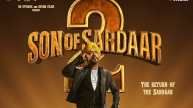21 years of Govind Nihalani’s vital exploration of the post-Godhra communal riots in Dev. Perhaps the only political film of his career, Amitabh Bachchan sinks his teeth as fence-sitting cop who gradually grows aware of the hydra-headed politics of communalism. There are two cops Dev Pratap Singh (Amitabh Bachchan) and Tejinder Khosla (Om Puri). Dev’s gradual realisation of the enormity of the politics behind the isolation of minorities in India is delicately though powerfully weighed against the uni-dimensional, almost villainous communalisation of Tejinder.
Speaking of the experience, Mr Bachchan said, “Govind Nihalaniji was a great all-rounder. From the direction and cinematography to the lunch on the sets, he takes care of it all. He always brings out a social reality through his cinema. He isn’t afraid to pick subjects that we only whisper about. Working with Govindji proved a revealing experience. Dev is a very powerful subject. It goes into a dark area of our society where we seldom venture. We seldom talk about the isolation of a community or how it affects the fabric of our nation. A film on the politicization of the police force has never been done before. A criticism is that Dev is too verbose. But the point is, how do you get across ideas in an issue-based film if not through the dialogues? Many times I’m asked where all those wonderful dialogues from the 1960s and 70s have gone. Now when we have a dialogue-driven film they complain it’s too wordy. Somewhere the critics will have to make up their minds about what they mind.”
Govind Nihalani’s cinema requires a different performing discipline. Did Mr Bachchan have to undergo a process of re-orientation in his performing skills? “No! The scenes, situations and dialogues are sufficient to guide an actor. If I’m asked to react to the horrors of a communal riot I’d instinctively know I’m not coming out of an egg (Amar Akbar Anthony) or dangling from a helicopter. In Dev, there were serious legitimate issues to be addressed. I reacted accordingly.”
Was Mr Bachchan moved by recreation of communal violence in Dev. “In the sequence where a whole chawl was burnt down I was petrified—first of all for the safety of the junior artistes who were jumping down in flames. Personally, it was very disturbing to relive such barbarism. But to filch away would be even more unacceptable. This is what happened. Everything in Dev has happened. The film probed recent wounds… I can’t say why audiences haven’t taken to the film. They’re the ones paying money to buy the tickets. If they don’t like a film, we’ve to accept their verdict.”
How does it feel to be an Indian Muslim? To be constantly reminded by rabid elements that your real home is across the border???? A Govind Nihalani film isn’t easy to watch. Dev raises even more complex issues than Ardh Satya (about the politicization of the police force) and Droh-Kaal (the politics of terrorism). It talks about the isolation of the Indian Muslim in the post-Gujarat scenario when even diehard secularists turned blatantly partisan, rendering the country’s law machinery into a den of horrific violence.
Debutant writer Meenaxi Sharma’s screenplay is one of the most powerful pieces of writing we’ve seen for Hindi cinema. Without raising issues just for a headlinish impact, the script creates a sense of all-consuming foreboding whereby the polarization of Hindus and Muslims becomes more than a power game. It becomes symptomatic of our pyramidically structured society where wily politicians, regardless of their religion are a law and a constitutional authority unto themselves.
At the centre of this terrible power structure are the two cops Dev Pratap Singh (Amitabh Bachchan) and Tejinder Khosla (Om Puri). Joined at the lip (through their introspective evening drinking sessions) if not at the hip (by their personal morality) Dev’s gradual realization of the enormity of the politics of the isolation of minorityism in India is delicately though powerfully weighed against the uni-dimensional almost villainous communalisation of Tejinder.
“They’re all terrorists,” Tej believes and lives by his communal credo to the end. Dev, the film’s lynchpin and conscience, has a much tougher job in going by his inner voice’s steep graph. He starts off as a disgusted cop who pointblank shoots a sneering insulting young man who by chance, turns out to be Muslism.
Den’s fence –sitting political ideology lurches across a legion of louring metabolic changes. In a corkscrew turning point , he’s attacked by a young Muslim Farhan(Fardeen Khan) who holds Dev responsible for his old father’s death during a Morcha that went all wrong. Here’s where Nihalani steps to show, as always, that oppression isn’t peculiar to any one people.
Perhaps a tad simplistically, the film lays the blame for all the communal strife in the city (unnamed, but Baroda by implication) to two politicians –one Hindu the other Muslim. Their foxy inflammatory machinations provide the only ‘filmy’ touch in this otherwise brutally-frank look at the communal divide and its grave lethally selfdefeating repercussions.
The way Nihalani expels his characters into his narration is not just jolting but also a measure of his skills as storyteller. He not only creates an emblematic structure for his characters but also allows them to grow beyond their structural roots to branch out as individuals firmly rooted to their societal reality.
Like Mani Rathnam’s Bombay(which was far more melodramatic) Dev also secretes a tender and moving love story that unfolds during times of communal riots. Farhan’s attachment to the girl nextdoor Aaliya (Kareena Kapoor) is celebrated in furtive glances thrown at one another from the terrace of the chawl as Aadesh Shrivastava’s haunting melody creates a sublime subtext to the routine milieu.
The love story works mainly because Fardeen and Kareena are so comfortable as a pair. Kareena doesn’t have much to do except steal into Fardeen’s abode with trays of homecooked food. As in Yuva, she not only transforms completely into character but also creates substantial space for it . In her 2 key sequences where she tries to stop Fardeen from taking to the gun and later comes forward before the police commission to expose the powerful rioters, Kareena’s face effortlessly becomes a map of the human heart.But the film and its grave repercussions are rooted to the two behemoths Amitabh Bachchan and Om Puri. As ideologically polarized cops they provide the flesh to Nihalani’s powerful parable of our times.
Om Puri is the film’s surprise packet. As the boorish communal cop he throws shocking lines and attitude into the narrative, often at the risk of seeming utterly villainish. The frightening part of the character and performance are their disturbing link to real-life headlines. Is society becoming more unidimensionally evil?
Amitabh Bachchan’s silences speak a scathing language of guilt anger and atonement. His monologue with wife Rati Agnihotri after he helplessly watches his colleague burn down a whole building of Muslims, is unforgettable, and so’s that moment towards the end when he unknowingly calls Farhan by his dead son’s name.
The riot scenes are vivid and graphic though never done in calculated colour schemes (as they were in Bombay). The most remarkable thing about Govind Nihalani’s cinematography is that this time, it isn’t remarkable at all.
The plot grows progressively optimistic about the communalisation of our society with the post-riots sequences acquiring a strange Shakespearean complexion. Om Puri ‘s villainous selfassertion and his final suicide are more Macbeth than Gujarat. But then Nihalani wants his powerful and haunting film to end with a final corkscrew twist. He did it in Aakrosh and Ardh Satya. He does it again in Dev. Without intentionally trying to grab our attention Nihalani has created a film that must be seen at a time when boys are in the mood for mindless Masti and girlfriends are out to Murder all sense of decorum.












